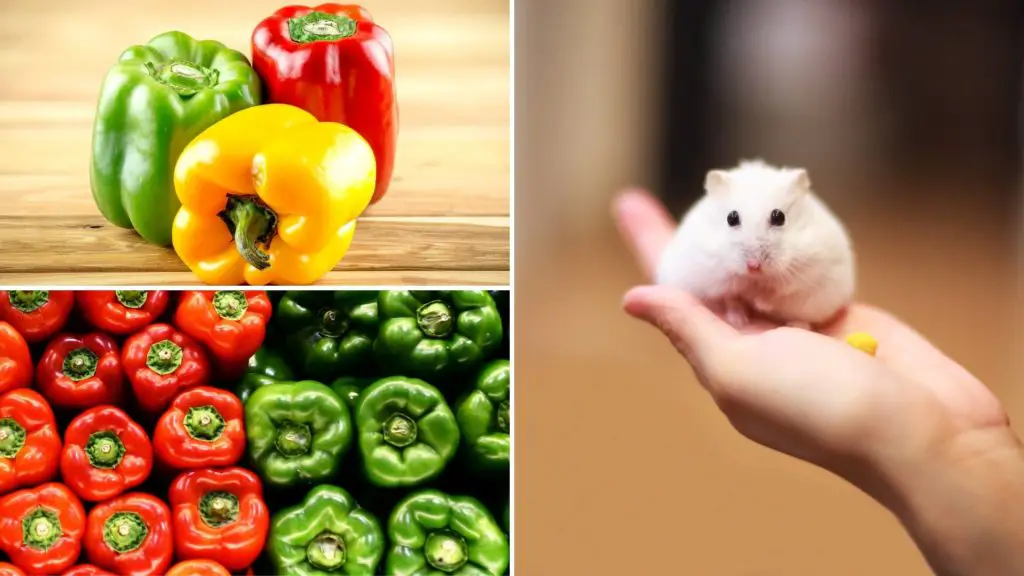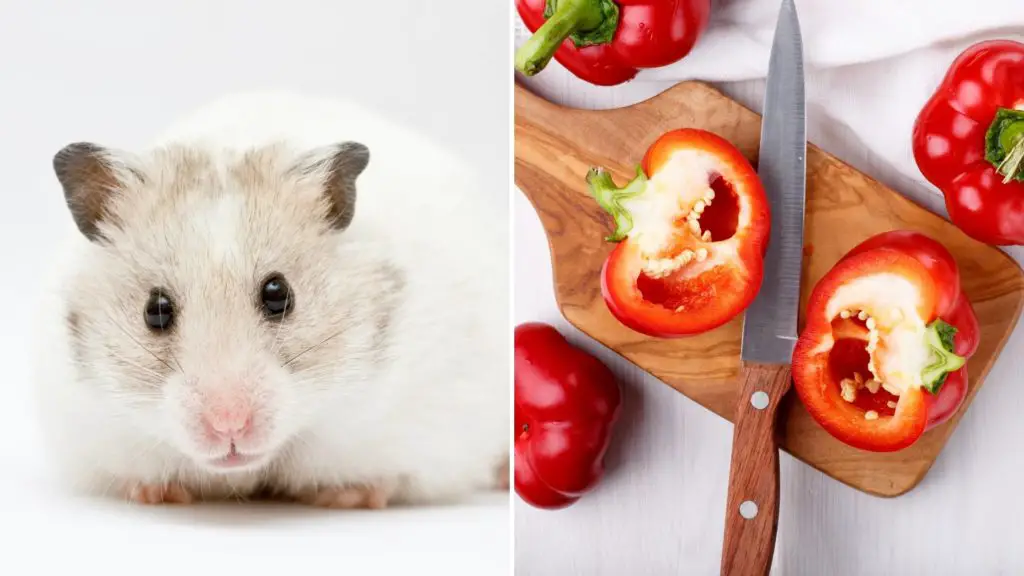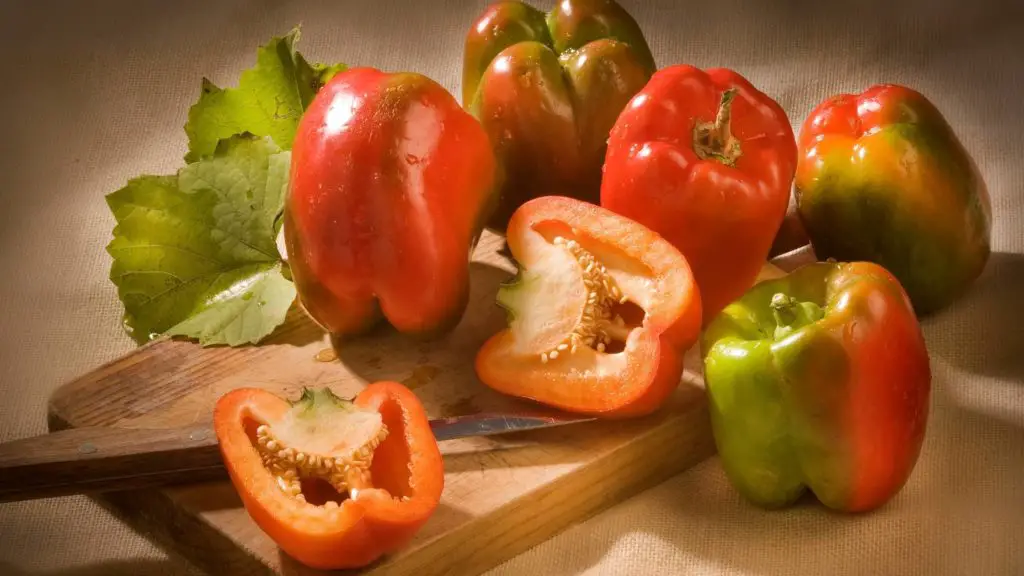Last Updated on 05/18/2021 by Veronica Jones
Pet owners always want to keep their pets healthy. However, it can be difficult to feed pets like hamsters because they need to eat more than their standard hamster food. So, many pet owners look for other snacks to supplement their hamster’s diets. Peppers can be great for humans, but can hamsters eat peppers? Here is everything you need to know to decide whether your furry friends can eat peppers.
Can Hamsters Eat Peppers?
Yes, hamsters can eat peppers. Peppers are a sweet and healthy snack that has many nutrients. However, hamsters can only eat bell or sweet peppers because spicy peppers are dangerous for them. Peppers should only be a snack for hamsters a few times a week.
Bell peppers and sweet peppers are a sweet treat for hamsters, but they are not part of their daily diets. Peppers have nutrients, but other foods would be better to give them daily. Therefore, peppers only serve as a fun, healthy weekly treat.

The Benefits of Peppers
Firstly, sweet peppers contain lots of vitamin C, which is good for hamsters. Hamsters mature and reproduce quickly, so vitamin C is a crucial vitamin for their development. Hamsters cannot make their own vitamin C, so they need it from their food to prevent diseases like scurvy. Vitamin C protects bodies against tissue and cell damage and helps bodies absorb iron better.
Vitamin C is an essential nutrient that helps produce collagen. More collagen means that a hamster will have healthier bones and skin. Additionally, vitamin C can boost wound healing. That way, a hamster will have faster healing if they get injured.
Bell peppers also have vitamin B6. Vitamin B6 aids in red blood cell production, which is important for all mammals. Vitamin B6 can help keep the nervous system healthy. It can also aid in a hamster’s metabolism of amino acids, fats and carbohydrates.

Red bell peppers contain pro-vitamin A that hamster’s bodies turn into vitamin A. Vitamin A supports eyesight, and a deficiency in vitamin A can lead to night blindness. Vitamin A can boost how white blood cells function and the immune system. Vitamin A also works with vitamin D, calcium, and protein to promote strong bones.
Peppers have vitamin E. Vitamin E is a fat-soluble vitamin, which has antioxidant effects. Antioxidants remove free radicals from the body, which can damage cells in the body. Vitamin E can prevent free radical damage, potentially slowing down the ageing process and preventing disease.
Peppers have some vitamin K1, which is crucial for blood clotting. Blood clotting is important in every living being because it will help stop bleeding if there is a wound or cut. Vitamin K could also support good bone health.
Peppers contain a good amount of fiber. Fiber is crucial for a hamster to support healthy digestion. Hamsters spend a lot of time chewing and eating. So, they need good digestive systems to absorb the nutrients and pass the food through their bodies.
Bell peppers have potassium that can help maintain high blood pressure. Potassium can place less strain on the hamster’s body because it helps maintain blood pressure and a healthy heart. Potassium can also support muscle and bone strength as a hamster gets older.
Possible Side Effects
Peppers do not have that much sugar, having about half the sugar than an apple would contain. However, the sweetness of the pepper comes from sugar. Natural sugar is fine for hamsters, but too much can be dangerous. Excess sugar can turn into fat to make a hamster overweight, causing other problems like cardiac stress, high blood pressure, etc. Therefore, hamsters should not have too much natural sugar to prevent long-term problems.
As mentioned earlier, peppers contain lots of fiber, but too much fiber is bad for hamsters as well. Too much fiber can actually block the digestive system, causing diarrhea, constipation and discomfort. Therefore, hamsters should not have too many bell peppers.
Bell peppers can pose a choking hazard if pet owners are not careful. Bell pepper seeds can make hamsters choke, so they should not eat the seeds. The peppers should also be cut into small, thin pieces so a hamster can easily bite and chew them. That way, there is a smaller risk of choking.
It is important to remember that not all hamsters are the same. It is rare, but some hamsters can be allergic to peppers. Pepper allergy symptoms include stomach aches, diarrhea, etc. If a hamster has these symptoms, offer water. If the symptoms do not go away, they will need to see a vet for treatment.
What Kind of Peppers Can Hamsters Eat?
Hamsters can only have sweet peppers or bell peppers. Bell peppers usually come in different colors, including green, yellow, red and orange. All of these colors are safe to give to hamsters. The peppers should be fresh and clean before pet owners give them to their hamsters.
All bell pepper colors have nutrients. However, the red bell pepper has the most nutrients, so they are the best to give to hamsters. Yellow and orange bell peppers have fewer nutrients than red peppers. Green bell peppers are not ripe, taste slightly bitter, and have the least number of nutrients. Green bell peppers are still safe for hamsters, but red and yellow peppers are better.
Remember that hamsters can not have spicy peppers. Spicy peppers like chili peppers are very dangerous for them. People often feel the heat when they eat a small spicy pepper, so a hamster would likely feel five times that heat. Additionally, hamsters have sensitive stomachs, so they will probably have upset tummies. Spicy peppers can also damage a hamster’s digestive system.
Can Hamsters Eat Bell Pepper Seeds?
No, hamsters cannot eat bell pepper seeds. Bell pepper seeds look small, but they are very large to hamsters. It is a choking hazard for a small hamster. It can also be difficult for a hamster to digest bell pepper seeds, causing upset stomachs and constipation.

How Many Peppers Can Hamsters Have?
Most healthy hamsters can eat a one-inch square of a bell pepper a few times a week. Typically, a quarter of a bell pepper can get fed to a hamster per week. The hamster does not need to eat the quarter all at once because they can eat it throughout the week, serving pieces of it every 2-3 days.
Larger hamsters like Syrian hamsters can eat the recommended amount mentioned above. A Roborobski hamster is a bit smaller, so they can eat a ¾ inch of bell pepper 1-2 times a week. Dwarf hamsters are very small, so they can only eat a ¼ inch of bell pepper once a week.
While bell peppers have some nutrients, it has a lot of sugar. Therefore, there are better foods to give hamsters daily, especially if the hamster is overweight. Pet owners can reduce risks by making sure their hamsters exercise a lot when they eat peppers. That way, they can “burn” off excess sugar and energy. However, overweight hamsters should avoid sweet treats like fruits and peppers.
Remember to give only a small amount of pepper if the hamster has not eaten peppers before. Each hamster is slightly different, so they may be sensitive to different foods. A hamster can try a small piece of pepper before they have it regularly. Observe the hamster after they eat a small piece of bell pepper. If nothing happens, they can have bell peppers as a treat.
How to Feed Hamsters Bell Peppers
Choose fresh peppers that are firm. They should not be soft with dark marks. Slice off enough bell pepper for the hamster. Cut the pepper slice into smaller pieces so a hamster can easily pick it up and eat it. Wash the bell pepper well to remove dirt and seeds. Hand the pepper pieces to the hamster.
Can Baby Hamsters Eat Peppers?
No, baby hamsters cannot eat peppers. Baby hamsters will nurse from their mothers for part of their lives. They may start to eat foods like wheat germ cereal, millet, etc. However, they should not have peppers until they are adults. Therefore, it would be best to wait until hamsters are 4-5 months old before they eat bell peppers.
Do Hamsters Like Peppers?
Yes, most hamsters do enjoy peppers. Bell peppers are usually sweet. So, hamsters will enjoy the treat from their usual foods. However, not all hamsters will like the same food. There is a rare chance that one hamster may not like them. Additionally, hamsters may dislike green bell peppers because they are more bitter than the other colors, so they may only like red or yellow bell peppers.

In Conclusion
Bell peppers can be a healthy and sweet treat for hamsters. While it will not be a part of their daily diets, it contains lots of nutrients that can benefit hamsters. However, they should not eat more than the recommended amount, and they can only eat sweet bell peppers.

